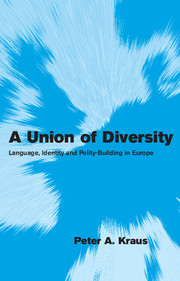Book contents
- Frontmatter
- Contents
- List of Tables and Figure
- Preface
- Acknowledgments
- A Union of Diversity
- 1 Introduction: The dynamics of European integration
- 2 The European Union's democratic deficit and the search for a European demos
- 3 The identity of a multinational polity
- 4 Language and politics: A challenge for Europe
- 5 The language question in the institutional complex of the European Union
- 6 Political communication in the transnational civil society
- 7 Recognition, self-determination and integration in a union of diversity
- References
- Index
- Titles in the series
6 - Political communication in the transnational civil society
Published online by Cambridge University Press: 22 September 2009
- Frontmatter
- Contents
- List of Tables and Figure
- Preface
- Acknowledgments
- A Union of Diversity
- 1 Introduction: The dynamics of European integration
- 2 The European Union's democratic deficit and the search for a European demos
- 3 The identity of a multinational polity
- 4 Language and politics: A challenge for Europe
- 5 The language question in the institutional complex of the European Union
- 6 Political communication in the transnational civil society
- 7 Recognition, self-determination and integration in a union of diversity
- References
- Index
- Titles in the series
Summary
The contentiousness of language policy within European institutions is closely bound up with the political character of the European Union (EU). Processes of communication within the Union have such a high practical and symbolic profile because they contribute essentially to the progressive constitution of a political community. The EU possesses extensive decision-making authority; European law has direct effects on all citizens of member states; and European politics is conducted within a highly differentiated complex of institutions with an independent executive, legislative and judiciary. Hence, the EU explodes the framework of a traditional international organization. Not only since the introduction of the Euro has its influence on the everyday lives of Europeans become virtually ubiquitous. It extends to a whole range of regulatory domains. In fact, there is scarcely a single policy field in the member states today in which the Community dimension is completely insignificant (Schmitter 1996b: 125). In areas such as agriculture and trade, it has long since become the dominant factor.
The considerable (and growing) importance of political processes in the institutions of the EU for the lives of its citizens cannot be doubted. But how do things stand with the communicative mediation of EU politics? Here there are evidently massive deficits. A constant chorus of complaints connects the political indifference of the subjects of European governance towards the outcomes of this very governance with the lack of information on EU affairs and the lack of transparency of decision-making processes in Brussels.
- Type
- Chapter
- Information
- A Union of DiversityLanguage, Identity and Polity-Building in Europe, pp. 139 - 179Publisher: Cambridge University PressPrint publication year: 2008

